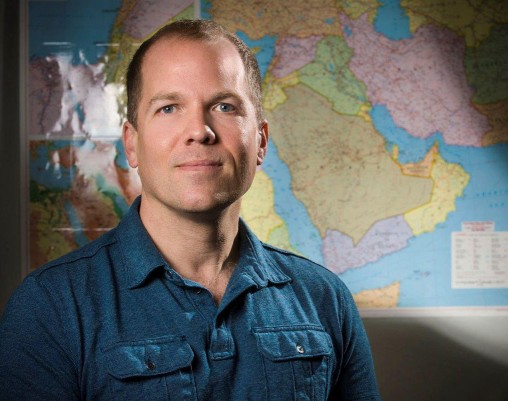
Vaughn Shannon, Wright State University associate political science professor, was elected to the board of directors of the prestigious Middle East Outreach Council.
Wright State University associate political science professor Vaughn Shannon has been elected to the board of directors of the prestigious Middle East Outreach Council, a national organization of educators who work to further understanding of the Middle East.
Shannon will serve a term on the five-member board from 2015 to 2017. His election will be confirmed at the council’s annual meeting in Denver on Nov. 21-22.
“I found that what I’ve been doing in the last 15 years is trying to negotiate how Americans understand the Middle East and everything that goes on there,” said Shannon. “I increasingly see that as a valuable contribution.”
Established in 1981, the Middle East Outreach Council is a national nonprofit organization working to increase public knowledge about the peoples, places and cultures of the Middle East, including the Arab world, Israel, Iran, Turkey and Afghanistan.
Affiliated with the Middle East Studies Association, the council is a national network of educators dedicated to disseminating apolitical and nonpartisan information.
“I want to make sure that in that educational process we get it right so we avoid stereotypes in the Islamic world,” Shannon said. “My theoretical training is in political psychology, so I see how prejudice and discrimination go hand in hand.”
Shannon received his doctorate in international security and Middle East politics from The Ohio State University in 2001 and teaches classes on Middle East politics and the Arab-Israeli conflict. He is faculty adviser of Wright State’s Model Arab League and Model UN programs and is working on a project to promote understanding and empathy of the Middle East through active learning and simulation.
Shannon’s research interests include international security, Middle East politics and political psychology. He is author of “Balancing Act: U.S. Foreign Policy and the Arab-Israeli Conflict.” He has published on U.S. policy toward the Arab-Israeli conflict (White House Studies), U.S. policy toward Iran (Journal of Iranian Research and Analysis) and on the U.S. image in the Middle East (Harvard International Review and Security Studies).
“What I am interested in doing is both educating and generating empathy across cultures,” Shannon said.
Earlier this month, Shannon traveled to Oman, a rapidly developing Arab country on the southeastern coast of the Arabian Peninsula, to make a site visit through the Center for International Learning. He hopes to develop a study-abroad program in Oman for Wright State students.

 Wright State University Foundation awards 11 Students First Fund projects
Wright State University Foundation awards 11 Students First Fund projects  Gov. DeWine reappoints Board Treasurer Beth Ferris and names student Ella Vaught to Wright State Board of Trustees
Gov. DeWine reappoints Board Treasurer Beth Ferris and names student Ella Vaught to Wright State Board of Trustees  Joe Gruenberg’s 40-Year support for Wright State celebrated with Honorary Alumnus Award
Joe Gruenberg’s 40-Year support for Wright State celebrated with Honorary Alumnus Award  Wright State’s elementary education program earns A+ rating for math teacher training
Wright State’s elementary education program earns A+ rating for math teacher training  Wright State’s Calamityville hosts its largest joint medical training operation
Wright State’s Calamityville hosts its largest joint medical training operation 